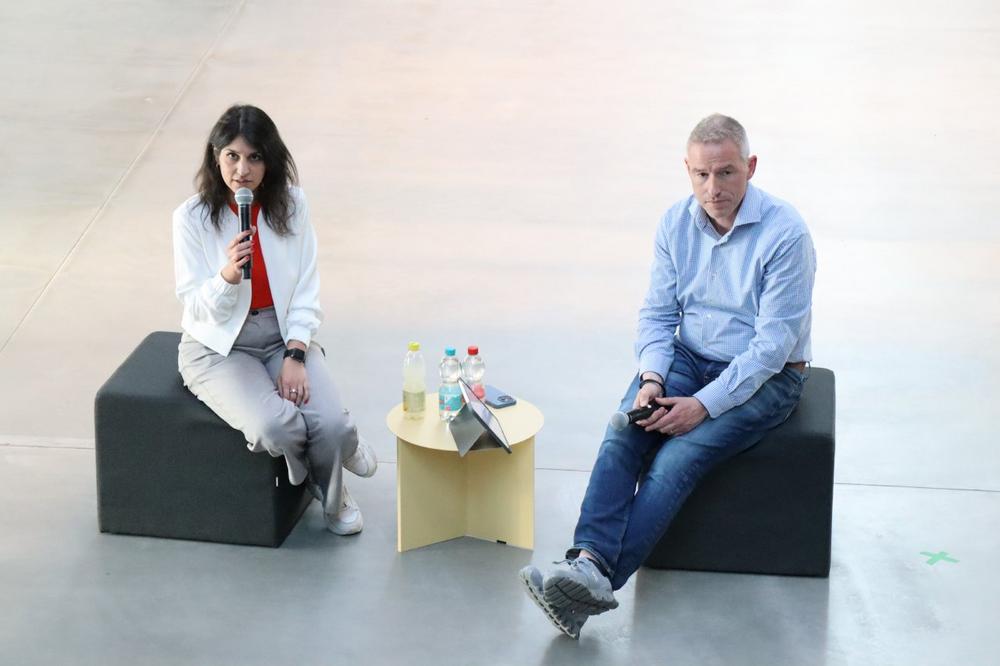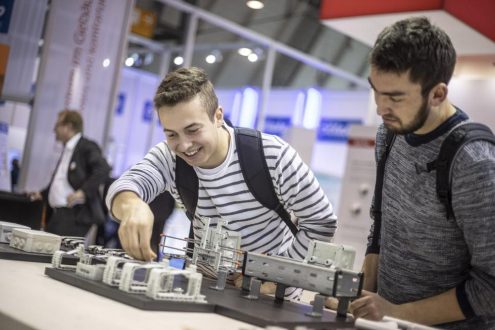
Responsible technology for a better world?
It was surely only a matter of time before she would appear in the emerging hub for Artificial Intelligence (AI) in southwestern Germany: Visibly proud, moderator Markus Hermsen-Huyke announced speaker Zamina Ahmad as one of the most sought-after AI experts in Germany at the fifth event in the “Learning from Legends” series at TUM Campus Heilbronn. The founder and CEO of the AI consulting firm “shades & contrast” with 15 years of experience in data and technology lived up to the high expectations: At the event “Under the Algorithm – The Fundamental Significance of AI” she neither praised AI as the solution to all of humanity’s problems nor demonized it as a gigantic threat. Instead, she clearly identified the advantages and opportunities and made constructive suggestions on how to deal with the risks.
The new technology offers great potential for a wide range of industries, the Hamburgeon explained to her audience, which consisted of students and doctoral candidates from various institutions on the Bildungscampus Heilbronn: “The future of AI is moving towards more autonomous AI agents, especially in business environments where operational efficiency and decision-making can be enhanced with human intervention.” There are promising start-ups in Germany in this area, such as Aloa.
Sorting out critical parameters
On the other hand, AI also harbors dangers, which Ahmad counters with her greatest vision: making AI fair and responsible. This is not exactly the same thing: “In essence, while fair AI focuses on preventing discrimination and bias, responsible AI takes a holistic approach to ensure that AI serves the greater good, aligns with ethical standards, and maintains the trust of the public and stakeholders.” A common problem is biased training data, which still makes it more difficult for women to obtain credit than men, for example.
“How can such biases be eliminated?” asked one of the students who actively participated in the discussion. Ahmad suggested that critical parameters could be filtered out. Siemens also tried this by removing gender as a category from automatic resume scans to increase gender equality and prevent women from being constantly filtered out. The results were surprising: the AI favored applicants who listed soccer as a hobby.
What humans do better
Regulations are also necessary: She describes the „EU AI Act“ as the first regulatory framework that balances innovation with ethical responsibility. The “human in the loop” principle is also very important: It is about ensuring humans remain integral to the AI decision-making process. A promising example comes from Taiwan, where AI has been implemented to detect misinformation. The results are then reviewed and labeled by a human.
When dealing with AI, humans must play to their strengths: “Future AI experts and leaders need to be adept in understanding context, setting goals, and bridging the gap between technology and people. They must be strategic thinkers, empathetic communicators, and capable of driving ethical AI use.” She is certain: ”The future lies in AI tools that ensure data protection and focus on combining human intuition with AI-driven insights.”
Die TUM Campus Heilbronn gGmbH
Bildungscampus 2
74076 Heilbronn
Telefon: +49 (0) 7131 264180
Telefax: +49 (7131) 645636-27
https://www.chn.tum.de/de
Telefon: +49 (7131) 26418-501
E-Mail: Kerstin.Besemer@tumheilbronn-ggmbh.de
![]()




